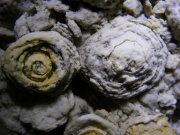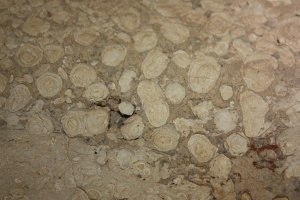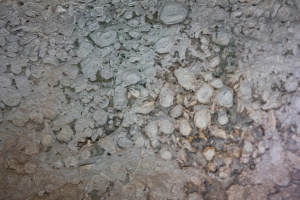Bedrock (Inventory)/Pisolites
From LagWiki
m (moved Pisolites (Inventory) to Bedrock (Inventory)/Pisolites) |
|||
| (8 intermediate revisions not shown) | |||
| Line 1: | Line 1: | ||
| - | + | {{Inventory image|File:Pisolites.JPG|Pisolites. Rarely are they as pronounced and distinguished as this.}} | |
| - | The '''Pisolites''' field should be used to list stations that exhibit | + | The '''Pisolites''' field should be used to list stations that exhibit [[Bedrock (Inventory)|bedrock]] with pisolites. |
| - | Pisolitic limestone (that is, bedrock limestone that contains pisolites) can be obscured by any type of secondary formation. They can also be found in breakdown -- anywhere that bedrock is exposed. | + | Pisolites are not a formation. They are an exposed characteristic of the original bedrock and exhibit as round nodules (sometimes with layers). They rarely appear singularly but instead most often appear in clusters or layers in the bedrock. The size can vary from pea-sized to larger. Very small varieties are often distinguished by being called "oolites" but for purposes of the ''CCNP Cave Inventory Form'', all pisolites and oolites no matter their size should be inventoried in this field. |
| + | |||
| + | Pisolitic limestone (that is, bedrock limestone that contains pisolites) can be obscured by any type of secondary formation. They can also be found in breakdown -- anywhere that bedrock is exposed. They are a characteristic of [[Bedrock (Inventory)/Backreef|backreef]] and are an indicator of backreef bedrock. | ||
Pisolites are not to be confused with [[Calcite (Inventory)/Pearl|cave pearls]]. | Pisolites are not to be confused with [[Calcite (Inventory)/Pearl|cave pearls]]. | ||
| Line 8: | Line 10: | ||
==See also== | ==See also== | ||
*[[Calcite (Inventory)/Pearl|Cave Pearl]] | *[[Calcite (Inventory)/Pearl|Cave Pearl]] | ||
| - | *[[ | + | *[[Bedrock (Inventory)/Backreef|Backreef]] |
==References== | ==References== | ||
*Palmer, Arthur N. (2007) ''Cave Geology'' CAVE BOOKS, Dayton, OH p 67 ISBN-13: [[Special:Booksources/978-0-939748-66-2|978-0-939748-66-2]], ISBN-10: [[Special:Booksources/0-939748-66-5|0-939748-66-5]] | *Palmer, Arthur N. (2007) ''Cave Geology'' CAVE BOOKS, Dayton, OH p 67 ISBN-13: [[Special:Booksources/978-0-939748-66-2|978-0-939748-66-2]], ISBN-10: [[Special:Booksources/0-939748-66-5|0-939748-66-5]] | ||
| + | |||
| + | ==Pisolites, Bedrock== | ||
| + | <gallery perrow=1 widths=300px heights=200px> | ||
| + | File:Pisolites.jpg|Pisolites | ||
| + | File:Pisolites 2.JPG|Pisolites | ||
| + | </gallery> | ||
{{Cave inventory}} | {{Cave inventory}} | ||
Current revision as of 03:10, 16 April 2014
The Pisolites field should be used to list stations that exhibit bedrock with pisolites.
Pisolites are not a formation. They are an exposed characteristic of the original bedrock and exhibit as round nodules (sometimes with layers). They rarely appear singularly but instead most often appear in clusters or layers in the bedrock. The size can vary from pea-sized to larger. Very small varieties are often distinguished by being called "oolites" but for purposes of the CCNP Cave Inventory Form, all pisolites and oolites no matter their size should be inventoried in this field.
Pisolitic limestone (that is, bedrock limestone that contains pisolites) can be obscured by any type of secondary formation. They can also be found in breakdown -- anywhere that bedrock is exposed. They are a characteristic of backreef and are an indicator of backreef bedrock.
Pisolites are not to be confused with cave pearls.
See also
References
- Palmer, Arthur N. (2007) Cave Geology CAVE BOOKS, Dayton, OH p 67 ISBN-13: 978-0-939748-66-2, ISBN-10: 0-939748-66-5
Pisolites, Bedrock



